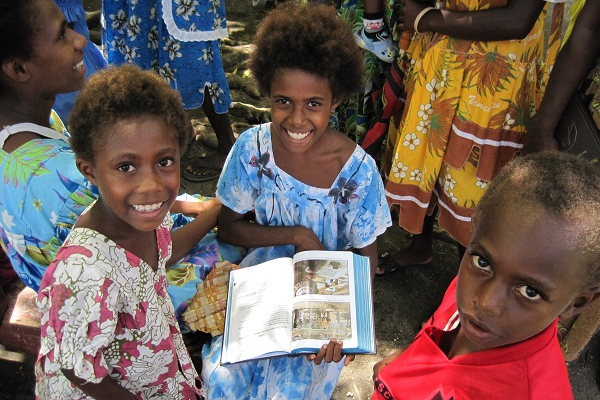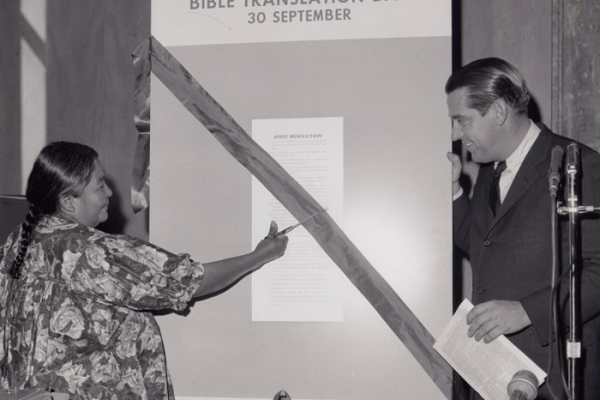Transformational Development: Meeting Community Needs Holistically
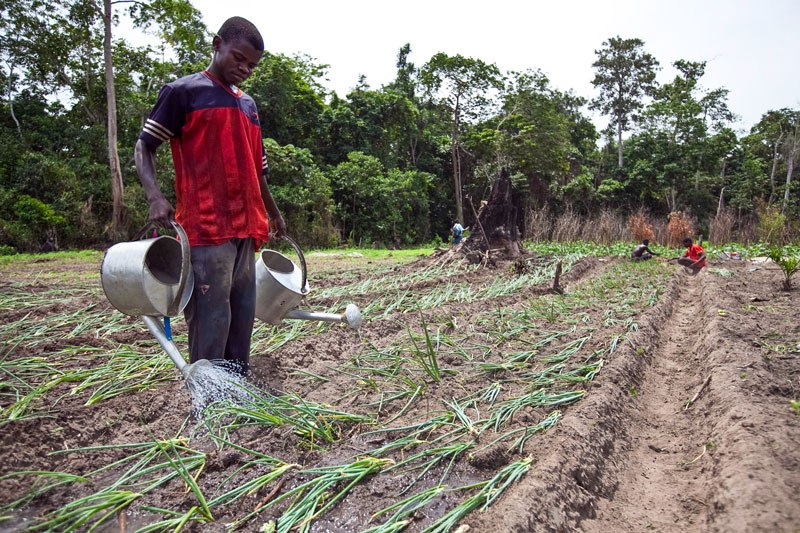
In Nigeria, farmers are using sustainable farming methods that don’t require expensive machinery; these methods are based on stewardship principles from Scripture. In parts of Asia, women are gathering in learning circles where they read from translated Bibles while also receiving training on nutrition, common health issues and children’s education.
These initiatives are referred to as “transformational development” and go hand-in-hand with Bible translation. Transformational development focuses on caring for the entire person and meeting the social, spiritual, physical and economic needs of a language community.
Since the beginning, Wycliffe Bible Translators USA has been committed to transformational development, pointing people to Christ through practically living out the Scriptures. Today Wycliffe USA and its partners continue to weave principles of transformational development throughout all facets of their work.
Craig Clendinen serves as the transformational development coordinator for LEAD Asia-Pacific, a Wycliffe USA partner. Craig is passionate about joining with and equipping communities around the world through transformational development.
How Could God Use Me?
Craig and his wife felt called to missions. But Craig couldn’t see how his skills and background as an attorney could be used for God’s Kingdom. “We thought [since] we’re not pastors or doctors, we just weren’t those traditional [jobs] that could be used in missions,” Craig laughed.
It wasn’t until a few years later, when they were having dinner with a missionary couple that they realized that God might have a place for them. The husband had been an F-16 fighter pilot in the U.S. Air Force. The man encouraged Craig: “If God can use an F-16 fighter pilot, he can use you!”
Little did Craig realize that at the same time, Wycliffe’s office of international relations was praying for someone with precisely Craig’s skill set and training to join their team.
God opened doors, and eventually Craig and his wife joined Wycliffe USA and moved to Washington D.C., where they represented the work of Bible translation and multilingual education before the nations of the world. When Craig flew to Tanzania to help set up a government relations and advocacy program, he interacted with multiple large Christian aid organizations that also had programs in Tanzania.
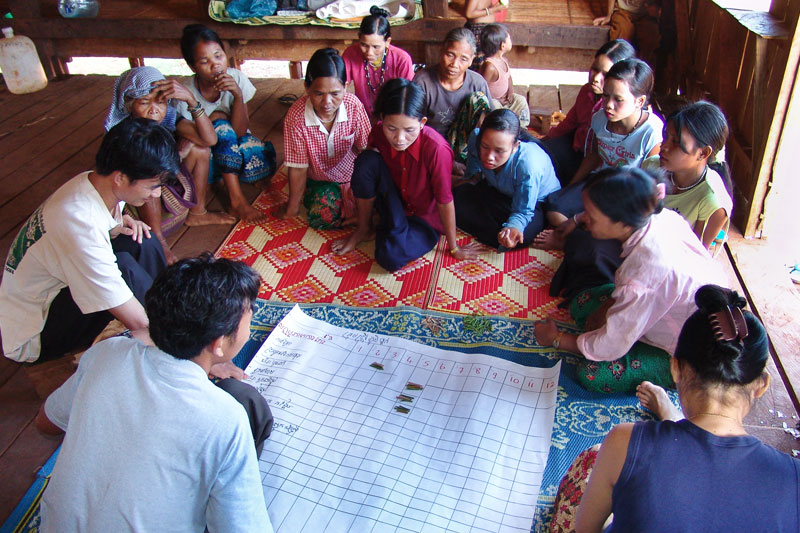
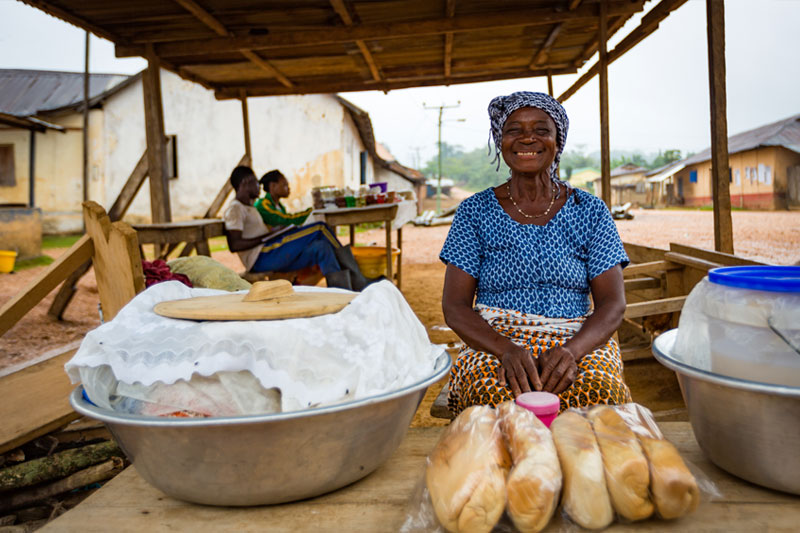
Excited for the possibility of partnership, Craig looked for language communities in Tanzania where both SIL, Wycliffe’s primary strategic partner, and other aid and development organizations worked. But to his dismay, he didn’t find a single language community. Most aid organizations focused on the larger communities where they could have the quickest impact and visibility, while SIL served in the smaller marginalized communities.
“These people are voiceless. No one cares about their vote because they don’t have enough votes to matter,” Craig said. “I felt broken for them. I realized … big organizations won’t be coming to do transformational development [in the small communities].” It would be up to organizations with opportunity, like Wycliffe and its partners, to make it a priority.
Now in his role as a transformational development coordinator, Craig serves local communities throughout Asia and the Pacific through consulting, training, technical help and connecting people with resources.
What is Transformational Development?
Transformational development follows five main principles.
- 1. Community empowerment and participatory involvement. This means that an outsider should not do for the community what they can do for themselves.
Craig visited a language community in Southeast Asia that needed bridges because they could not transport their rice to a local market. A transformational development organization offered to train the language community on how to build the bridge but told them they would have to fund it entirely on their own. The community agreed, raising all the money needed to pay for materials and labor, and the bridge was built. Some of the community leaders proudly showed Craig their ledger. “Look,” they said. “We know everyone who contributed to this project!”
Now the language community doesn’t just have bridges, but they have strengthened their local economy, gained effective knowledge and enabled their entire village to take ownership of and invest in the project. Encouraged by their success, the community moved on to build wells, dig latrines and spearhead other improvements.
Craig noted how much of a difference transformational development made in that community, “compared to an [outside] group coming saying, ‘We'll paint that building for you’ and do nothing to empower you,” he concluded.
- 2. Transformational development is not top down.
Instead of doing something for a community, Wycliffe desires to do it with the community and let them take the lead. The community is the one who sets the agenda and identifies the priorities. “As long as it’s not against biblical principles,” Craig explained, “there will be times when the community will want something that might not have been in our plan, but maybe we should do that instead.”
- 3. Practitioners follow an asset-based approach.
It’s easy to be tempted to automatically try to fix problems when you first encounter them, but an asset-based approach focuses on what the community already has that is working well.
“God’s been in that community long before Wycliffe,” Craig said, “and he put resources in that community for those people. [Instead] of telling them that they need to be fixed and you are going to help them, understand that it is their community and God has given them assets to solve those problems.”
- 4. It is important that both the community and the development organization bring value to the project.
The language community and the development organization must be equal partners in the project, both bringing something valuable to the table. “If SIL brings knowledge on how to do the translation, then perhaps the language community could provide for physical needs such as a building or food for a workshop,” Craig said. This not only helps strengthen the quality of the initiative but also grows and strengthens relationships, both within the community and between the community and the outside teams.
- 5. Communities speak into what needs to be changed and the effectiveness of change.
Effective transformation isn’t caused by a translated Bible just sitting on a shelf. Instead God’s Word needs to settle deep into the hearts and minds of people, resulting in holistic changes throughout the community. For example as a result of Bible translation, how do peoples’ identities and their relationships between each other and God change? Is the community becoming more resilient in the face of globalization, urbanization, climate change and environmental problems? Is the community flourishing spiritually, physically and economically? Are unjust systems becoming more just?
Transformational development seeks to show how God’s Word impacts all areas of individuals' lives and community life as a whole, making a difference to their social, spiritual, physical and economic experiences.
Dreaming Bigger
Transformational development is significantly impacting communities across the globe, changing the hearts and minds of both local and national leaders. Wycliffe’s great desire is to empower and serve the local church in its transformational development efforts. "My big dream," Craig said, "is that … we could encourage [the church] and inspire them to live out their big dreams through Christ."
Learn more about transformational development in our webinar.



